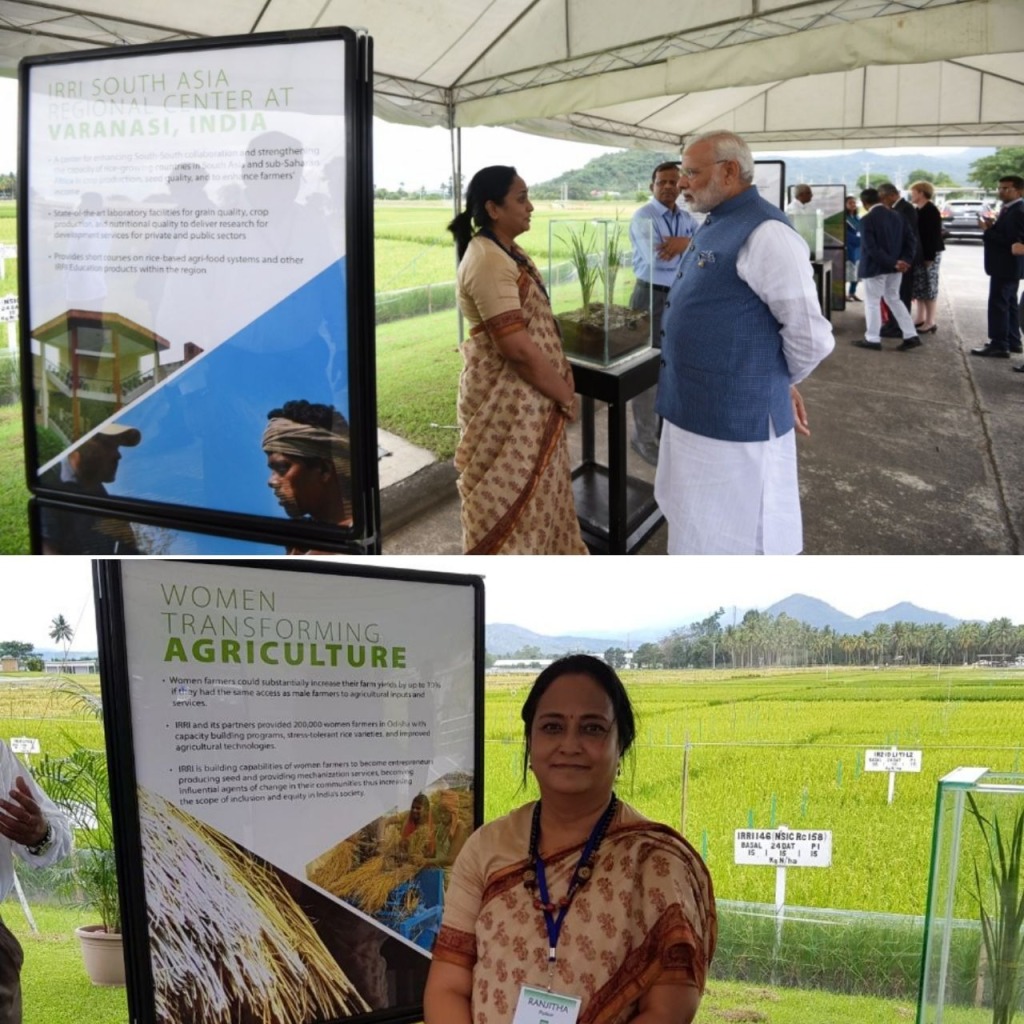For economists and researchers who work in gender and agriculture like Dr Ranjitha Puskur, nothing is more heartening than having a government body invest in their work. After all, that’s how their pilot studies can really reach their intended beneficiaries on a larger scale.
And so, Dr Puskur, country representative for India and research leader of the Gender & Livelihoods programme at CGIAR‘s International Rice Research Institute (IRRI), is quite impressed with Odisha’s commitment to empowering women farmers.
“Odisha’s state government is one of the most progressive governments in India in this regard,” says Dr Puskur, who also leads the CGIAR Impact Platform Evidence Module. “The state is doing really well. They are looking for science and research-based policies, and not just randomly going populist. Other states have a lot to learn from them,” she says.
Gender and climate change
Working with governments is all in a day’s work for Dr Puskur, whose global teams at CGIAR (Consortium of International Agricultural Research Centers) help identify countries and hotspots where women are at most risk to climate change.
“That allows governments to decide where to invest money and what to prioritise so that we are not increasing the risk and vulnerabilities these populations face,” she explains of her team’s core mission.
They have been working with governmental and non-governmental bodies in Odisha for over a decade, focused on women’s entrepreneurship and development, along with other Indian states such as Bihar and Uttar Pradesh.
Dr Puskur’s own research has been focused on mobilising science and knowledge for innovation in pro-women and pro-poor developmental outcomes in Africa, South and Southeast Asia, and the Pacific.

An example she shares is how her team, funded by the Odisha state government, incubated an all-women farmers’ company in Kalahandi, Odisha, considered one of the most backward districts in the state, known for its droughts, famine and abject poverty.
“We helped them build capacity during the pandemic. Now we have 1800 women into entrepreneurship and paddy seed production. This is an all-women farmer producer company (FPC) – no one had ever imagined this, no one had done this in India. ‘Can this even happen?’ people asked. We have shown that it can happen and these women are doing it! They are great seed producers; they are even marketing it under a brand called Certified Seed,” she says.
She goes on, “Mind you, these are rural women, most of them are not even educated. We gave them the right knowledge – technical skill-building to produce, business-skill building to sell, understanding the market, playing the market – then connected them with the right institutions, the certification agencies, the banks to get loans. None of that is a grant. It is their own money, their share capital. We only provide skill building and networking support, that’s it.”
The FPC number game
Her testimony bears much weight. In her career spanning 18 years in CGIAR, Dr Puskur has led initiatives such as the CGIAR research programme on aquatic agricultural systems, and its WorldFish gender strategy, which for the first time in CGIAR focused on gender-transformative approaches and led to new thinking in the system.
She has also developed IRRI’s gender research-for-development strategy. Her work has looked at migration and feminisation in rice-based systems, land rights and influence on decision-making, and women’s entrepreneurial engagement for economic empowerment.
Coming to the FPC story in India, she states, “India has come up with a scheme to set up 10000 FPCs and farmer producer organisations (FPOs) with a budgetary provision of Rs 6865 crore. I see it as a number game. Most of them don’t work. Instead of setting up 9000 dysfunctional ones, we should set up 1000 functional ones that are viable and that will make a much bigger difference.”

She cautions that not many facilitating agencies have the capacities to set up that many FPCs. “It’s not just about lack of monetary resources, it’s also about a lack of understanding. A lot of them think FPCs are self-help groups. The truth is, FPCs are commercial entities. We proved it by making the Kalahandi women’s FPC a viable project.”
Besides, she adds, the government’s goal of 10000 FPCs does not have any specific provisions for women. “It’s mostly men who take over the decision-making. There’s sometimes just one woman in the room, or sometimes even in a room full of women and just one man, it’s the man taking all the decisions. That’s what we are trying to show: that women are very capable of handling FPCs themselves,” she avers.
Women in government
Getting government officials on board with her research is another step on the ladder to helping women farmers. “It depends on the rapport you have [with the officials]. It takes time to build that. All governments are different; not all respond to us the same way.”
She believes that while having women leaders in the government helps definitely in creating representation, she does not believe it is the only way to ensure gender-equal policies on the ground. “It’s mostly still men in the decision-making positions in the government. But many of them are responsive and do take action when presented with evidence,” she says.

CGIAR’s gender initiatives work largely in eastern India due to the greater need for upliftment in the region. Besides Odisha, Dr Puskur shares that Bihar too has made significant progress when it comes to women’s development. “It has the largest number of women self-help groups. Their whole JEEViKA programme has been quite transformational for the rural scene in a conservative, traditional place like Bihar,” she says, citing an initiative that brought millions of rural women into the mainstream banking system.
She also speaks of progress in patches of Uttar Pradesh such as in Rae Bareilly and Amethi. “It’s really about organisations – be it research or development – being very intentional about doing this,” she says.
“We can’t just assume that women will benefit from such-and-such policies. We have to ask the right questions. How many women are aware of those policies? Who is giving them information about them? Are they even able to access those programmes? How do we make it easier for them to do that? What are the challenges they are facing? These are all the practical issues we address.”
The science of empowerment
Dr Puskur’s team uses in-person interviews to collect evidence of programme implementation. The process of information collection itself presents several challenges and reveals unspoken social truths in rural households.
“We ask them, who makes decisions in your household? First of all, the villagers have never thought about that. They never realised that it’s an important thing. Secondly, even when they do understand, how do we change the dynamic? How do we give women exposure and access to more information and knowledge so that they become confident about taking part in dialogues within the household and influence decisions? It’s a slow process,” she says.
What she and her team noticed is that women from scheduled castes and scheduled tribes often have a greater say in household decision-making than women from upper castes and upper classes. “Which is so fascinating, isn’t it? One wouldn’t expect it because these upper-caste and upper-class women are better educated, they’ve gone to school, they have had more resources. But no, all Indian women are not the same,” she says.

Dr Puskur believes the term ‘women’s empowerment’ is used too loosely. “It’s the most used and abused and least understood word in development. Do we understand what it means? Or how profound that term is?” she asks. “It is about a woman’s ability to make strategic life choices, as Naila Kabeer says.”
Expanding on the feminist economics of Kabeer, an Indian-born British-Bangladeshi social economist, research fellow, writer and professor at the London School of Economics, Dr Puskur goes on, “Being able to decide when she wants to get pregnant or not, married or not, whether she wants to do this job or that enterprise – that is the real measure of women’s empowerment. Otherwise, by giving her a little bit of income, or some work to fill the hours, you have only put some money in her hands. But who is benefitting from that, who is making decisions about that money?”
Evidence shows that, if given control over finances, women invest their income in household betterment. “Their first priority is not buying a sari or a piece of jewellery. It’s about children’s education or household assets,” says Dr Puskur.
Not all women
“If we want to change things, we have to stop trying to homogenise women. We have to understand and project the nuances. Not all women are victimised, not all women are vulnerable, not all women face the same challenges,” she points out. “It’s about how we understand and develop solutions for all. We can’t grow as economies by leaving women behind.”
Dr Puskur, who holds a PhD in agricultural economics from Indian Agricultural Research Institute, New Delhi, points to socio-cultural stereotypes and especially how things are projected in the media. “Media has an important role to play in these social transformations that need to happen and that can lead to food-systems transformations as well. They need to feed on each other. But we don’t talk about it enough, and when we do, we use a lot of generalisations and stereotypes,” she says.
While advocating for practical solutions, she adds, “Change won’t happen overnight. We have to keep chipping away.”


Aketa, I follow your blog and magazine here, and I just came in to say that I loved the episode featuring you and your husband. Just saw it now and loved everyone in it, including your (late) dogs and the beautiful story of becoming a family.
LikeLiked by 1 person
Hey Prerna, thank you for following eShe and thank you also for your sweet words!! 🙂
LikeLike
Hi. A fact check. The first all women farmer producer company has been established in year 2015, Shahpur block, Madhya Pradesh named Chirayu which had received award 2 years ago. It was supported by Small Farmer Agriculture Consortium, facilitated by PRADAN having approx 1300 members. PRADAN since then has promoted all women FPO/ FPCs only, currently have 83 are being nurtured.
LikeLike
That’s wonderful! Thank you for sharing this information!
LikeLike
They haven’t mentioned the NGO that would have organised the women FPCs in Udisha.
LikeLike
Hi there. The pilot project in Odisha was conducted by IRRI (International Rice Research Institute). You can read more about it on the IRRI website: https://www.irri.org/news-and-events/news/closing-gap-women-focused-initiative-empowers-farmers-odisha
LikeLike